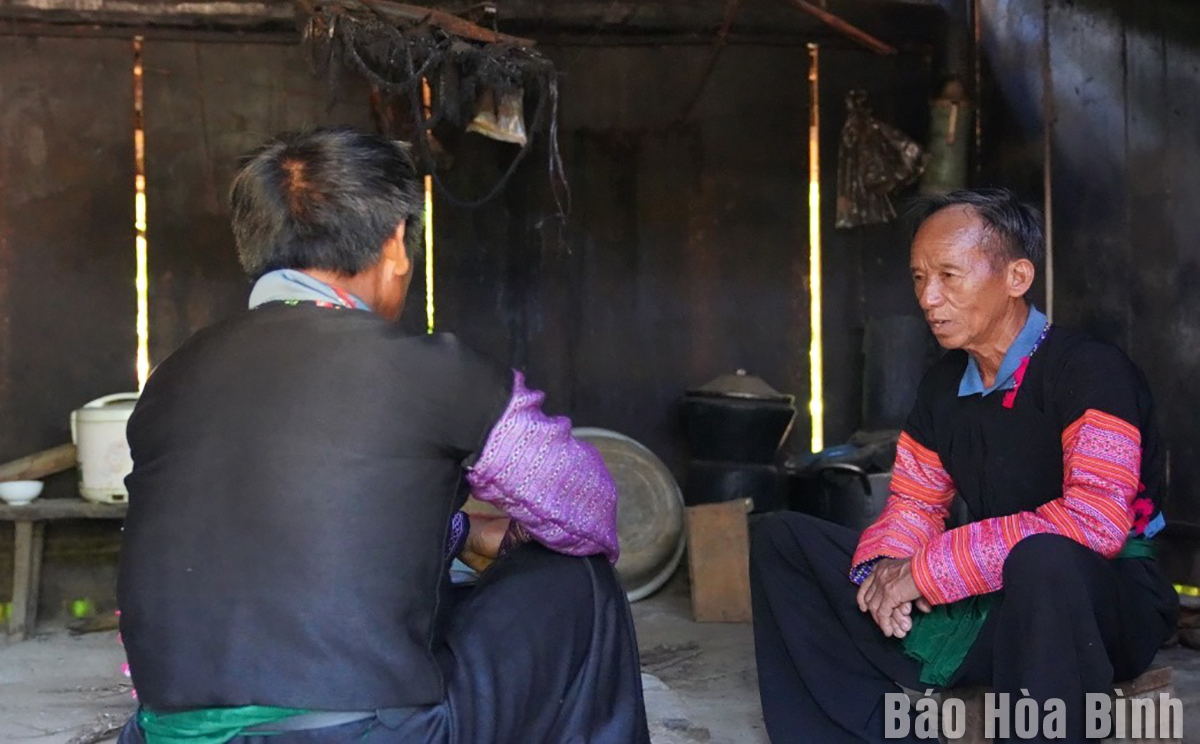
In addition to their efforts to encourage
residents to dutifully implement the Party's directives and resolutions and the
State's policies and laws, venerable figures of the local communities are
actively contributing to the effective execution of public order and security
initiatives at the grassroots level.

Elder Sung A Denh of Thung Man
village, Hang Kia commune, Mai Chau district, successfully persuades long-time
drug addict Kha A Vang to undergo a rehabilitation process.
Despite his advanced age, Sung A Denh, living in
Thung Man village, Hang Kia commune, Mai Chau district, consistently participates
in disseminating information and mobilising his descendants and fellow
community members to comply with the Party and State’s directions, policies,
and laws. His notable efforts include motivating drug addicts to voluntarily
seek rehabilitation and encouraging fugitives to surrender.
The reputable elderly, together with the heads
of various clans in the commune, personally visited each household to encourage
drug addicts to voluntarily undergo rehabilitation, succeeding in the
persuasion of 23 individuals.
According to Colonel Nguyen Ngoc Minh, head of
the provincial police’s internal security department, between 2010 and now, old
people representing the H'Mong ethnic community in Mai Chau’s Hang Kia and Pa
Co communes have successfully persuaded 16 drug-related fugitives to surrender.
Meanwhile, the reputable's group of the Dao ethnic community has engaged in
communications works targeting dozens of cases involving illegal immigration to
China for undocumented labour, urging them to return to their localities. In Da
Bac district, venerable people have mobilised 60 Dao ethnic people in Doan Ket
commune, who were involved in illegal logging in the local Pu Canh Nature
Reserve, to comply with the police’s requirements, facilitating related
investigation and law enforcement activities.
Statistics indicate that there are 283 venerable
people in Hoa Binh joining in the nationwide movement for the homeland's
security protection. Minh said they have clearly demonstrated their role,
responsibilities, and significance as a crucial pillar of the party committee
and government in implementing democratic regulations at the grassroots level.
More than just an information technology teacher, Bui Van Nien is an inspiring figure who has nurtured the scientific curiosity and creative spirit of students in Vietnam’s ethnic minority communities.
Da Bac is the most disadvantaged mountainous district in Hoa Binh province, with ethnic minorities accounting for about 90% of its population. Over the past years, the district has mobilised resources to implement ethnic policies to improve the quality of life of local people.
In recent years, Hoa Binh province has consistently prioritised the protection, care, and education of children, particularly those from ethnic minorities and disadvantaged backgrounds, by creating a safe, healthy, and nurturing environment for their all-round development.
The Steering Committee for Tobacco Harm Prevention and Control of Hoa Binh province, in coordination with the Tobacco Harm Prevention and Control Fund, held a ceremony on May 28 in response to the World No Tobacco Day (May 31) and the National No Tobacco Week (from May 25 to 31). The event was chaired by Nguyen Van Toan, Standing Vice Chairman of the provincial People’s Committee and head of the Steering Committee.
Since 2021, the Center for Industrial Promotion and Industrial Development Consulting (CIIDC) under the Department of Industry and Trade has been implementing a school lighting model as part of the plan for using energy efficiently and economically in Hoa Binh Province in the pẻiod of 2021 - 2025. This model not only aims to improve the learning conditions and enhance the education quality, but it also promotes the message of energy saving, energy security, environmental protection and contributes to the goals of socio-economic development.
In the 2024 - 2025 school year, the entire Hoa Binh provincial education sector includes 520 educational institutions and schools. Among them are 13 ethnic boarding schools with 153 classes and 4,487 students. Four of these schools have met national standards, reaching 30.7 percent.



